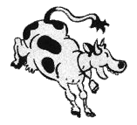by Hans DePold, town historian
(Published in the Bolton Community News, August 1999)
There are times when a farmer can't rightly spit lest he set off his entire herd of cows. What spooks the herd is often a mystery. But sometimes, someone comes forward years later to confess to the whole matter.
In many ways life in Bolton following World War II was similar to life in Bolton just after the Revolutionary War. A great war had just been won, the community was close-knit, and the population was almost the same size--about 1,279 people. Townspeople who lived here in the 1950s say Bolton was a beautiful example of rural America. Most homes were large and historic, surrounded by great expanses of farmland and open space.
In 1941, when Bill Roberts brought his family to their Bolton farm on the corner of Hebron Road and Shoddy Mill Road, he joined the Bolton Volunteer Fire Department. At that time fires were fought with bucket brigades. It was not until the end of the war, in 1945, that the town bought its first pump truck. It was about then that Bill bought a dog for his wife, Beatrice, and their young children David and Peggy.
Where Bolton Motors stands today there was a store called Gowdy's that sold just about everything, including fireworks. In 1950 Bill Roberts had done something special; he had ordered three large professional rockets. That year Bill decided he was going to have a blast. (We once had a cannon on the Bolton green but in 1835, after too much hard cider, our militia loaded the cannon with gunpowder and stuffed its mouth with stones and sod. When they fired it, that was its last blast.)
As darkness descended on July 4, 1950, Bill Roberts reasoned that his neighbors had gone to bed or were away in Hartford watching the fireworks, so he would not be disturbing anyone as he set up the three huge rockets in his backyard. With buckets of water ready just in case, his family and dog watched from the side of the house.
With the whoosh of the first rocket, the dog ran for cover. The yard was illuminated as the rocket stopped at its peak altitude and a flower of light spread across the sky. Then ominous silver-streaking bombs descended 200 feet and exploded like thunder.
When the second rocket took off, so did the dog. He bolted across Hebron Road heading for the Masseys' cow pasture. He had always seen the cows treated with dignity and respect, which is more than the Roberts family was showing him that night. The trees were illuminated and again there was a thunderous roar from over the Roberts' farm. The dog was now in the Masseys' cow pasture and the little herd was beginning to get spooked.
Something went wrong with the last rocket. It began to fall over just as it ignited.  It narrowly missed the Roberts' roof and was heading for the Masseys' cow pasture. The Roberts watched nervously as it burst little more than 200 feet above the ground and entered the cow pasture at a high speed and a low angle. Distorted by the high speed, it must have looked like a big cat from hell descending on them. Then the magnesium fuses ignited and silvery claws streaked to about 20 feet above the herd, followed by an earthshaking peal of explosions. Cattle were running loose everywhere and the Roberts' dog disappeared into the night.
It narrowly missed the Roberts' roof and was heading for the Masseys' cow pasture. The Roberts watched nervously as it burst little more than 200 feet above the ground and entered the cow pasture at a high speed and a low angle. Distorted by the high speed, it must have looked like a big cat from hell descending on them. Then the magnesium fuses ignited and silvery claws streaked to about 20 feet above the herd, followed by an earthshaking peal of explosions. Cattle were running loose everywhere and the Roberts' dog disappeared into the night.
According to Dave Roberts, he and his father helped round up the Masseys' cows that night. They were all back in the barn for milking the next morning, but the dog did not return for a week.
The Roberts' farm was sold two years ago. Dave and Peggy were educated in the Bolton school system. Dave is now a doctor in Putnam and Peggy is a vice president for State Street Corporation in Boston.